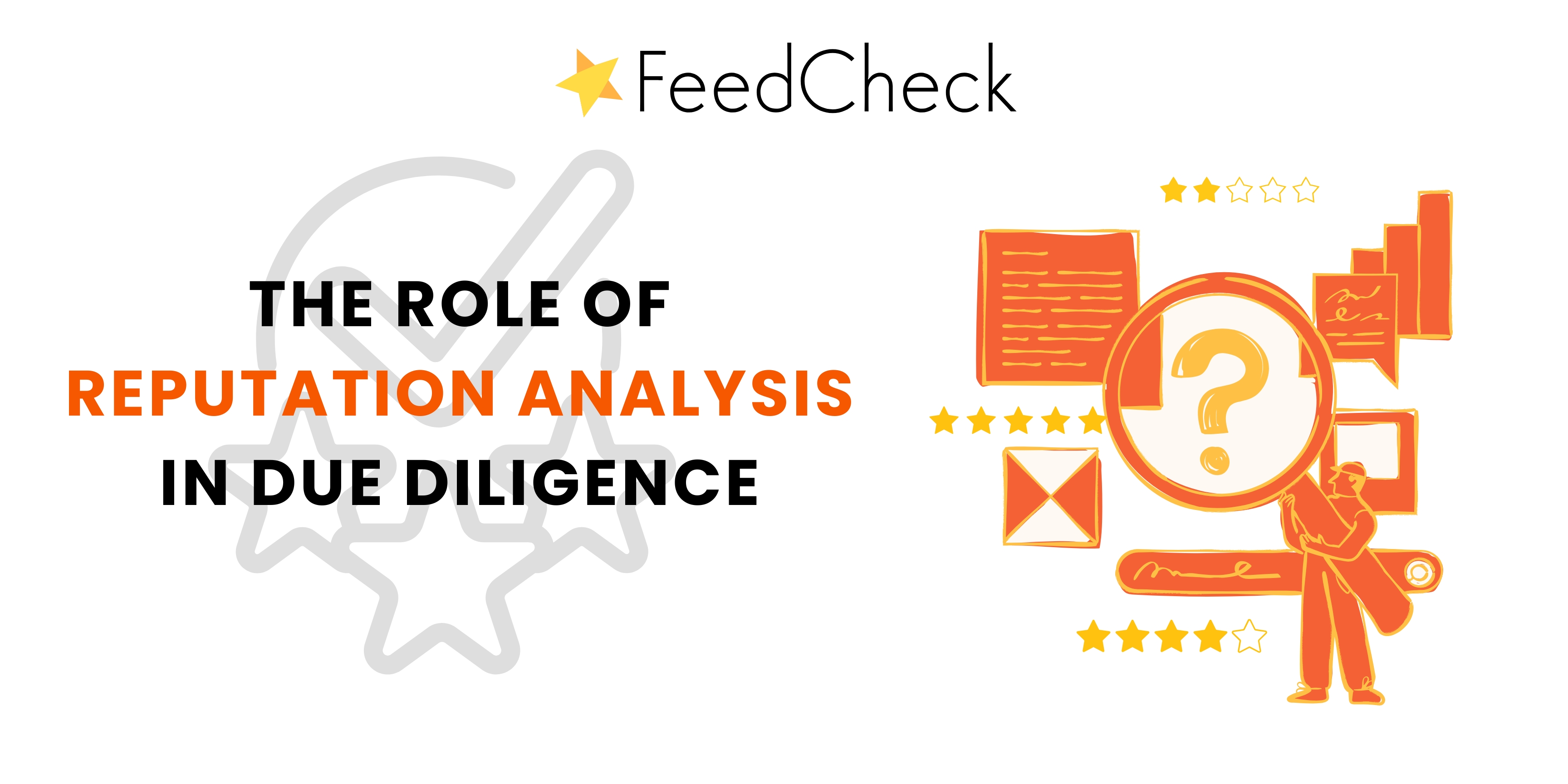Today’s dynamic business environment means the process of due diligence is no longer confined just to legal contracts or financial statements. As its scope continues to evolve, one area has become increasingly crucial: the role of reputation analysis in due diligence.
Whether you’re an investor evaluating a target company, a brand considering strategic partnership, or an executive safeguarding your portfolio, reputation analysis in due diligence is a non-negotiable step. It’s more than just a Google search – a vital part of risk management that can make or break a deal.
What is due diligence?
Due diligence is essentially a process of discovery that is relevant in key business transactions. It has the the purpose of assessing risk, determining value and price, and confirming various facts and data.
Traditionally, due diligence focused on areas such as legal compliance, financial wealth, company structure, and regulatory issues. But businesses are growing more more interconnected, and public scrutiny is becoming more intense. Consequently, the need for deeper insights into a company’s cultural, social, and reputational standing is growing rapidly too.
According to Deloitte, 90% of over 300 surveyed executives now consider reputation risk to be the most significant risk area for companies. However this shift isn’t surprising – the business ecosystem is becoming more transparent and consumer-driven, making public perception play a key role in all operations, from customer acquisition to investor confidence.
Modern due diligence processes now include everything from legal, compliance, and financial checks, to operational reviews, environmental, social, and governance aspects, and reputational risk evaluations. This thorough process is also for entities associated with portfolio companies, because being linked to an organisation with a tarnished reputation can create guilt by association, jeopardizing the reputation of an entire portfolio.
This expanded scope ensures that companies and investors are not just protecting against litigation or poor returns, but are also shielding themselves from the reputational fallout from associating with a problematic entity.
A company’s reputation is a key driver of its perceived value. In fact, having a compliance expert and a reputation management strategy as part of your due diligence and communications plan can significantly reduce exposure to reputational harm and protect long-term value.
The role of reputation analysis in due diligence
The power of reputation analysis in due diligence lies in its ability to surface insights that traditional processes often miss. It goes beyond what’s listed in a contract or printed in an annual report and presented by employees. Reputation analysis tells you how a business is perceived, whether that’s by consumers, partners, competitors, or the public at large.
And these perceptions matter more than we may think. A Trustpilot report found that consumers rank a company’s online reputation as more important than the quality of its products or services. Meanwhile, 88% of consumers trust online reviews as much as personal recommendations, according to Big Commerce. Clearly, public sentiment has a direct impact on purchasing decisions and on revenue.

Unfortunately, not all brands are happy with how they’re portrayed online. As many as 20% of businesses believe Google misrepresents their brand, negatively impacting engagement and conversion rates. When reputation monitoring isn’t part of the daily activities, companies risk losing not just customers, but also investor confidence.
For investors, this is critical. A company’s public reputation can be a leading indicator of future performance, brand resilience, and even share price valuation. Just as a strong reputation serves as a buffer against market changes, a poor one can erode value rapidly. That’s why assessing brand sentiment should be treated as seriously as financial forecasting.
On a similar note, from a consumer perspective, reputation reveals a company’s trustworthiness, reliability, and its social and environmental responsibility. Consumers do their own research to ensure companies align with them in terms of social responsibility and ethical standards.
Because of the huge importance of reputation analysis in due diligence, incorporating reputation management in business operations (such as monitoring online reviews, engaging with customers, and promptly addressing negative feedback) can mitigate risk and enhance consumer trust.
How to do reputation analysis?
Conducting reputation analysis in due diligence requires a methodical approach. It’s not enough to simply run a quick Google search and scroll through a few headlines. Reputation is far more nuanced, often shaped by hundreds of individual touchpoints. From product reviews and news coverage to social media discourse and executive behavior, investors, consumers, and brands need to stay aware.
Thanks to modern technology, it’s now possible to monitor and interpret these data points efficiently. Tools powered by AI offering sentiment analysis have transformed how businesses assess reputational risk, offering a complete view of brand perception.
These platforms scan online reviews, discussion forums, social channels, and news outlets in real-time, scouring the web in just seconds. This way, they are able to provide more comprehensive insight into what people are saying and how they feel. Sentiment analysis in particular helps decode the emotional tone behind words, distinguishing between praise, complaints, or constructive criticism.

FeedCheck for reputation analysis in due diligence
This is where FeedCheck excels. As a leading review monitoring platform, FeedCheck enables business and investors to take the guesswork out of reputation analysis.
We aggregate reviews from dozens of sources into one streamlined dashboard and, with our AI-powered sentiment analysis, we categorize feedback by theme – whether it’s customer service, product quality, shipping times, or company ethics. This makes it easy to identify patterns, emerging issues, or reputation strengths at a glance.
For due diligence purposes, this functionality is incredibly useful. With FeedCheck, you can:
- Assess a potential acquisition target’s brand perception in real time
- Identify red flags in customer sentiment across markets
- Compare sentiment trends between competitors or industry benchmarks
- Explore recurring complaints and measure the effectiveness of previous crisis responses
- Track how public perception has shifted over time
By giving investors a data-driven look into how companies are perceived by the public, FeedCheck enables better risk assessment and more informed investment decisions. It’s like having a real-time reputation audit – but it’s automatic, saving you time and energy.
Conclusion
We live in a time when public opinion can change overnight and, with reviews having the power to make or break a business, reputation analysis in due diligence becomes more of a strategic need than ever before.
Smart investors and business leaders recognize that a company’s public image directly affects its value, trustworthiness, and resilience. By proactively incorporating tools like FeedCheck into this process, they mitigate risk and bring to the surface hidden issues.
We’ll help make sure they’re not just buying into numbers – they’re investing in brands with a future. If you’re looking to start reputation monitoring, get in touch with FeedCheck and discover how our platform can bring you clarity, speed, and confidence. Contact us for a demo and let us do the work for you.
